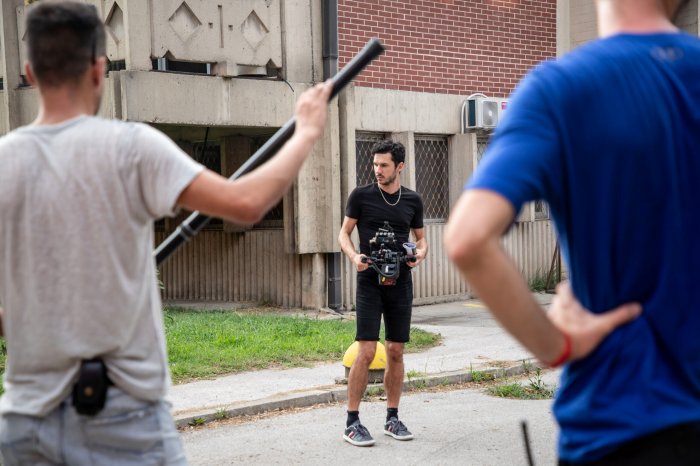BY STEVE ERICKSON | Out gay Buddhist surrealists don’t come a dime a dozen.
It’s our loss that, so far, New York audiences have largely ignored the work of Thai director Apichatpong Weerasethakul. He can draw a large audience for a one-off festival screening, but his past two films, “Tropical Malady” (one of the best gay-themed films of the past decade) and “Syndromes and a Century,” closed after brief runs at the IFC Center.
His reception back home has been equally troubled, if in a different way. The Thai censors snipped out several minutes of explicit sex from his second film, “Blissfully Yours.” While that decision was somewhat understandable, if not justifiable — the MPAA here would undoubtedly have given the film an NC-17 — the outrage felt by some Buddhists toward Apichatpong’s portrayal of their religion in “Syndromes and a Century” led to more cuts. From an American perspective, this decision seems simply bizarre. Apichatpong’s films don’t give the impression that he’s out to stir up trouble, but he manages to do so nevertheless.
In Cannes top prize-winner, terminally ill Thai man embraces his past and after lives
The American release of “Uncle Boonmee Who Can Recall His Past Lives,” which took home the top prize in Cannes last year, is an event, and one hopes New York audiences are finally paying attention. It’s the most immediately accessible part of an elaborate artwork called “Primitive,” which includes a seven-screen installation, a separate single-screen installation, and an artist’s book, “Cujo.” “Primitive” will appear in New York beginning May 19 at the New Museum (235 Bowery at Prince Street, through July 3; newmuseum.org).
Uncle Boonmee (Thanapat Saisaymar), a middle-aged man dying of kidney failure who receives dialysis every night, has come back to the rural forest of northeastern Thailand. Although a widower, he gets along well with his late wife’s sister, Jen (Jenjira Pongpas). During an evening meal, the ghost of Boonmee’s wife, Huay (Natthakarn Aphaiwonk), pops up. Following her, Boonmee’s son, Boonsong (Geersak Kulhong), who has turned into a monkey spirit and now looks like Chewbacca from “Star Wars,” drops by as well. These visitations seem designed to prepare Boonmee for his oncoming death.
After Apichatpong’s black-and-white debut, “Mysterious Object at Noon,” all of his films have been marked by their rich colors. His cinematographers are devoted to the fine gradations among the thousands of potential shades of green, gray, and brown. Apichatpong has a painter’s eye for light and color, as well as an ability to use darkness as counterpoint. In an early scene in “Uncle Boonmee Who Can Recall His Past Lives,” a water buffalo escapes its rope and wanders off into the forest. Its journey is a feast for the eyes.
If you’re interested in this film, don’t wait for Netflix. Many of its scenes are so dark that they’re bound to look unbearably muddy on a home monitor, even a big one.
Throughout his work, Apichatpong has seemed fascinated by the paranormal, although his films give the impression he doesn’t think of it in those terms. “Tropical Malady” featured a talking baboon. In “Uncle Boonmee Who Can Recall His Past Lives,” the boundaries between humanity and nature have completely collapsed. A woman has sex with a catfish after taking off all her jewelry and dropping it at the bottom of a river. Boonmee calmly accepts that his son has turned into an ape. Living people have conversations with ghosts with equal ease.
“Uncle Boonmee Who Can Recall His Past Lives” is marked by its remarkably gentle tone. Despite that, it makes a few gestures toward political reality. Boonmee recalls fighting Communists, in an oblique reference to the Thai Communist Insurgency movement of the 1970s, and wonders what effect this might have on his karma. Another character makes disparaging remarks about undocumented Laotian immigrants, claiming that they’re a bunch of thieves and murderers. (The subject of illegal immigration into Thailand also came up in “Blissfully Yours.”)
In his director’s statement in the film’s press kit, Apichatpong writes, “For the past few years in Thailand, nationalism, fueled by the military coups, brought about a confrontation of ideologies. There is now a state agency that acts a moral policeman to ban ‘inappropriate’ activities and to destroy their contents… [Uncle Boonmee] is the emblem of something that is about to disappear.”
I’ve generally felt that it takes at least two viewings to fully appreciate Apichatpong’s films, although their sensual pleasures are always immediately apparent. There’s no key to unlock the mysteries of “Uncle Boonmee Who Can Recall His Past Lives,” which extend to the final minutes and the two endings they offer up. Keeping audiences puzzled is part of Apichatpong’s project, but if his films are demanding, they also serve up many rewards along the way. They tend to include long scenes of daily life, but, paradoxically, they move along briskly and are never boring.
Apichatpong’s work is starting to reverberate outside Thailand — the Italian reincarnation parable “Le Quattro Volte,” which also opens at Film Forum later this month, shows his influence — but it remains sui generis. No one else is making films this exciting and challenging.
Complete Information:
UNCLE BOONMEE WHO CAN
RECALL HIS PAST LIVES
Directed by Apichatpong Weerasethakul
Strand Releasing
In Thai with English subtitles
Opens Mar. 2
Film Forum, 209 W. Houston St.

































